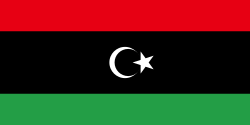كورال:
يَا بِلَادِي يَا بِلَادِي
بِجِهَادِي وَجِلَادِي
اِدْفَعِي كَيْدَ الْأَعَادِي وَالْعَوَادِي
وَاسْلَمِي اِسْلَمِي اِسْلَمِي
اِسْلَمِي طُولَ الْمَدَى
إِنَّنَا نَحْنُ الْفِدَاء
لِيبِيَا لِيبِيَا لِيبِيَا
١
يَا بِلَادِي أَنْتِ مِيرَاثُ الْجُدُودْ
لَارَعَى اللَّٰه يَدًا تَمْتَدُّ لَكْ
فَاسْلَمِي إنَّا عَلَى الدَّهْرِ جُنُودْ
لَا نُبَالِي إِنْ سَلِمْتِ مَنْ هَلَكْ
وَخُذِي مِنَّا وَثِيقَاتِ الْعُهُودْ
إِنَّنَا يَا لِيبِيَا لَنْ نَخْذِلَكْ
لَنْ نَعُودْ لِلْقُيُودْ
قَدْ تَحَرَّرْنَا وَحَرَّرْنَا الْوَطَنْ
لِيبِيَا لِيبِيَا لِيبِيَا
كورال
٢
جُرُّدَ الْأَجْدَادُ عَزْمًا مُرْهَفَا
يَوْمَ نَادَاهُمْ مُنَادٍ لِلْكِفَاحْ
ثُمَّ سَارُواْ يَحْمِلُونَ الْمُصْحَفَا
بِالْيَدِ الْأُولَىٰ وَبِالْأُخْرَى السِّلَاحْ
فَإِذَا فِي الْكَوْنِ دِينٌ وَصَفَا
وَإِذَا الْعَالَمُ خَيْرٌ وَصَلَاحْ
فَالْخُلُودْ … لِلْجُدُودْ
إِنَّهُمْ قَدْ شَرَّفُواْ هَذَا الْوَطَنْ
لِيبِيَا لِيبِيَا لِيبِيَا
كورال
٣
حَيِّ الْمُخْتَارْ أَمِيرَ الْفَاتِحِينْ
إِنَّهُ فِي لِيبِيَا رَمْزُ الْجِهَادْ
حَمَلَ الرَّايَةَ فِينَا بِالْيَمِينْ
وَتَبَعْنَاهُ لِتَحْرِيرِ الْبِلَادْ
فَانْثَنَىٰ بِالْمَجْدِ وَالْفَتْحِ الْمُبِينْ
وَرَكَزْنَا فَوْقَ هَامَاتِ النِّجَادْ
رَايَةً حُرَّةً
ظَلَّلَتْ بِالْعِزِّ أَرْجَاءَ الْوَطَنْ
لِيبِيَا لِيبِيَا لِيبِيَا
كورال
٤
يَا ابْنَ لِيبِيَا يَا ابْنَ آسَادَ الشَّرَىٰ
إِنَّنَا لِلْمَجْدِ وَالْمَجْدُ لَنَا
مُذْ سَرَوْنَا حَمِدَ الْقَوْمُ السُّرَىٰ
بَارَكَ اللَّٰهُ لَنَا اسْتِقْلَالَنَا[4][5][6][b]
فَابْتَغُوا الْعَلْيَاءَ شَأْوًا فِي الْوَرَىٰ
وَاسْتَعِدُّواْ لِلْوَغَىٰ أَشْبَالَنَا
لِلْغِلَابْ … يَا شَبَابْ
إِنَّمَا الدُّنْيَا كِفَاحٌ لِلْوَطَنْ
لِيبِيَا لِيبِيَا لِيبِيَا |
Kūrāl:
Yā bilādī yā bilādī
Bi-jihādī wa-jiladī
Idfa'ī kaydal a'adi wa-l-'awadi
Wāslamī islamī islamī
Islamī ṭūla-l-mada
Innanā naḥnu-l-fidā
Lībiyā Lībiyā Lībiyā
I
Yā bilādī anti Mīrāthu-l-judūd
La ra'Allahu yadān tamtaddu lak
Fā-slamī innā ʿaladdahri junūd
La nubālī in salimti man halak
Wa-khudī minnā wathīqāti-l-ʿuhūd
Innanā yā lībiyā lan nakhdilak
Lan na'ud li-l-quyud
Qadd taḥarrarnā wa-ḥarrarnā-l-waṭan
Lībiyā Lībiyā Lībiyā
Kūrāl
II
Jurrud al-ʾajdādu ʿazmān murhafā
Yawma nādāhum munādi li-l-kifāḥ
Thumma sārū yaḥmilūna-l-muṣḥafā
Bīlyadi-l-ʾūlā wa-bī-l-ʾukhrā-s-silaḥ
Faʾiðā fī-l-kawni dīnun wa-ṣafā
Waʾiðā-l-ʿālamu khayrun wa-ṣalaḥ
Fā-l-khulūd … li-l-judūd
Innahum qad sharrafū haðā-l-waṭan
Lībiyā Lībiyā Lībiyā
Kūrāl
III
Ḥayyi-l-mukhtar amir al-fātiḥīn
Innahu fī Lībiyā ramzu-l-jihād
Ḥamala-l-rāyata fīnā bī-l-yamīn
Watabaʿanāhu litaḥrīri-l-bilād
Fānthanā bī-l-majdi wa-l-fatḥi-l-mubīn
Wa-rakaznā fawqa hāmāti-l-nijād
Rāyatan ḥurratan
Ẓallalat bī-l-ʿazi arjā al-waṭan
Lībiyā Lībiyā Lībiyā
Kūrāl
IV
Yā bna Lībiyā yā bna āsāda-š-šarā
Innanā li-l-majdi wa-l-majdu lanā
Muð sarawnā ḥamida-l-qawmu-s-surā
Bāraka-llahu lanā istaqlalanā[4][5][6][b]
Fābtaġū-l-alyā ashāʾwan fī-l-warā
Wāstaʿiddū li-l-waġā ashbālanā
Lilġilab ... yā šabāb
innamā-d-dunyā kifāḥu li-l-waṭan
Lībiyā Lībiyā Lībiyā |
[kuː.rɑːl]
[jæ bi.læː.diː jæ bi.læː.diː]
[bi.ʒi.hæː.diː wæ.ʒi.læ.diː]
[ɪd.fæ.ʕi kæjd æl.ɑ.ʕæ.di wæ‿l.ʕɑ.wæ.di]
[wæs.læ.miː ɪs.læ.miː ɪs.læ.miː]
[ɪs.læ.miː tˤuː.læ‿l.mæ.dæ]
[ɪn.næ.næː næħ.nʊ‿l.fi.dæː]
[liː.bi.jæː liː.bi.jæː liː.bi.jæː]
1
[jæ bi.læː.diː æn.ti miː.rɑː.θʊ‿l.ʒu.duːd]
[læ rɑ.ʕɑɫ.ɫɑ.hu jæ.dæːn tæm.tæd.dʊ læk]
[fæːs.læ.miː ɪn.næ ʕɑ.læd.dæh.ri ʒu.nuːd]
[læ nu.bæː.liː ɪn sæ.lɪm.ti mæn hæ.læk]
[wɑ.χu.diː min.næː wæ.θiː.qɑː.tɪ‿l.ʕʊ.huːd]
[ɪn.næ.næː jæ liː.bi.jæː læn næχ.di.læk]
[læn nɑ.ʕʊd lɪl.qʊ.jud]
[qɑdː tæ.ħɑr.rɑr.næː wæ.ħɑr.rɑr.næː‿l.wɑ.tˤɑn]
[liː.bi.jæː liː.bi.jæː liː.bi.jæː]
[kuː.rɑːl]
2
[ʒʊr.rʊd æl.ʔæʒ.dæː.dʊ ʕɑz.mæːn mur.hæ.fæː]
[yæw.mæ næː.dæː.hum mu.næː.dɪ lɪl.ki.fæːħ]
[θʊm.mæ sɑː.rʊː yɑħ.mɪ.luː.næ‿l.mʊsˤ.ħɑ.fæː]
[bɪːl.jæ.dɪ‿l.ʔu.læː wæ.bɪː‿l.ʊχ.rɑ‿s.si.læħ]
[fæ.ʔi.ðæː fɪː‿l.kæw.ni diː.nʊn wɑ.sˤɑ.fæː]
[wæ.ʔi.ðæː‿l.ʕɑː.læ.mʊ χɑj.rʊn wɑ.sˤɑ.læħ]
[fæːl.χʊ.lʊːd lɪl.ʒʊ.dʊːd]
[ɪn.næ.hum qɑd ʃɑr.rɑ.fuː hæ.ðæː‿l.wɑ.tˤɑn]
[liː.bi.jæː liː.bi.jæː liː.bi.jæː]
[kuː.rɑːl]
3
[hæj.jɪ‿l.mʊχ.tɑr æ.mir æl.fæː.tɪ.ħiːn]
[ɪn.næ.hu fiː liː.bi.jæː rɑm.zʊ‿l.ʒi.hæːd]
[ħɑ.mæ.læ‿l.rɑː.jæ.tæ fiː.næː biːl.jæ.miːn]
[wæ.tæ.bæʕ(ɑ).næː.hu lɪ.tɑħ.riː.rɪ‿l.bi.læːd]
[fæːn.θæ.næː bɪːl.mæʒ.di wæl.fæt.ħɪ‿l.mʊ.biːn]
[wæ.rɑ.kæz.næː fɑw.qɑ hæː.mæː.tɪ‿l.ni.ʒæːd]
[rɑː.jæ.tæn hʊr.rɑ.tæn]
[ðˤɑɫ.ɫɑ.læt bɪːl.ʕæ.zɪ ɑr.ʒæː æl.wɑ.tˤɑn]
[liː.bi.jæː liː.bi.jæː liː.bi.jæː]
[kuː.rɑːl]
4
[jæː‿b.næ liː.b(ɪ).jæː jæː‿b.næ æː.sæː.dæ‿ʃ.ʃɑ.rɑː]
[ɪn.næ.næː lɪl.mæʒ.di wæl.mæʒ.du læ.næː]
[mʊð sɑ.rɑw.næː ħæ.mi.dæ‿l.qɑw.mu‿s.su.rɑː]
[bɑː.rɑ.kɑ‿ɫ.ɫɑ.hʊ læ.næː‿ɪs.tɪq.læ.læ.næː][4][5][6][b]
[fæːb.tæ.ʁʊː‿l.ʕɑl.jæː æ.ʃæːʔ.wɑn fɪː‿l.wɑ.rɑː]
[wæːs.tæ.ʕɪd.dʊː lɪl.wɑ.ʁɑː æʃ.bæː.læ.næː]
[lɪl.ʁɪ.læb jæː ʃæ.bæːb]
[ɪn.næ.mæː‿d.dʊn.jæː ki.fæː.ħʊ lɪl.wɑ.tˤɑn]
[liː.bi.jæː liː.bi.jæː liː.bi.jæː]
|
Chorus:
O my country, o my country,
With my struggle and gladiatorial patience,
Drive off all enemies plots and mishaps
Be saved, be saved, be saved
Be saved all the way
We are your sacrifices
Libya, Libya, Libya!
I
O my country, You're the heritage of my ancestors
May Allah not bless any hand that tries to harm you
Be saved, we are for ever your soldiers
No matter the death toll if you've been saved
Take from us the most credential oaths,
We won't let you down, Libya
We will never be enchained again
We are free and have freed our homeland
Libya, Libya, Libya!
Chorus
II
Our grandfathers stripped a fine determination
When the call for struggle was made
They marched carrying Qur'an in one hand,
and their weapons by the other hand
The universe is then full of faith and purity
The world is then a place of goodness and godliness
Eternity is for our grandfathers
They have honoured this homeland
Libya, Libya, Libya!
Chorus
III
Hail Al Mukhtar, the prince of conquerors
He is the symbol of struggle and Jihad
He raises our flag high
And we follow him, freeing our homeland,
He was praised with glory and conquest manifest
And raises hope for Libya in heaven,
A free flag
Over a rich country,
Libya, Libya, Libya.
Chorus
IV
O son of Libya, O son of lions of the wild
We're for honour and the honours are for us
Since we began struggling, people all over praised
May Allah bless our Independence[4][5][6][b]
So seek height as a quality in mankind
Our cubs, be prepared for the foreseen battles
Our youths, to prevail
Life is only a struggle for our homeland
Libya, Libya, Libya! |


